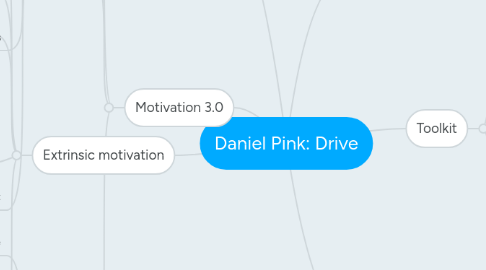
1. Extrinsic motivation
1.1. Unethical behavior
1.1.1. Moral obligation vs Transaction
1.1.2. Provoked by narrow, short-term goals
1.2. Addiction
1.2.1. Principal/agent theory (Suvorov)
1.2.1.1. Rewards are addictive
1.2.2. Rewards provoke risk-seeking behaviors
1.3. Short-term thinking
1.3.1. Rewards limit breath and depth
1.4. Carrots and Sticks: 7 deadly flaws
1.4.1. 1. They can extinguish intrinsic motivation
1.4.2. 2. They can diminish performance
1.4.3. 3. They can crush creativity
1.4.4. 4. They can crowd out good behavior
1.4.5. 5. They can encourage cheating, shortcuts, and unethical behavior
1.4.6. 6. They can become addictive
1.4.7. 7. They can foster short-term thinking
1.5. It works when...
1.5.1. The task is routine
1.5.2. The task is enabling
1.5.3. Rewards are non-tangible
1.5.4. Feedback gives useful information
1.5.5. Reward is unexpected and offered after completion
2. Self-determination theory
2.1. Fundamental needs
2.1.1. Competence
2.1.2. Autonomy
2.1.3. Relatedness
3. Motivation 3.0
3.1. Autonomy
3.1.1. 4Ts
3.1.1.1. Team
3.1.1.2. Technique
3.1.1.3. Time
3.1.1.4. Task
3.1.2. Decision latitude
3.2. Mastery
3.2.1. Flow
3.2.1.1. Mihaly Csikszentmihalyi
3.2.1.2. A state
3.2.1.2.1. Challenges well matched to our abilities
3.2.1.2.2. Immediate feedback
3.2.1.2.3. Clear goals
3.2.1.3. Oxygen for the soul
3.2.1.3.1. Play or non-instrumental activity
3.2.1.3.2. Flow more likely to be reached at work than in leisure
3.2.2. Three laws
3.2.2.1. Mastery is a mindset
3.2.2.1.1. Entity vs incremental theory of intelligence
3.2.2.1.2. Performance vs learning goals
3.2.2.1.3. Helpless vs mastery-oriented response to adversary
3.2.2.2. Mastery is a pain
3.2.2.2.1. Grittiness the most accurate predictor of success
3.2.2.2.2. Effort is one of the things that gives meaning to life
3.2.2.2.3. Being a professional is doing the things you love to do, on the days you don't feel like doing them.
3.2.2.3. Mastery is an asymptote
3.2.2.3.1. Mastery is impossible to realize fully
3.2.3. Compliance vs Engagement
3.3. Purpose
3.3.1. The purpose motive
3.3.1.1. "Purpose provides activation energy for living"
3.3.1.2. Opposed to profit motive
3.3.2. Goals
3.3.2.1. Purpose maximization
3.3.2.2. Purpose driven diff from socially responsible
3.3.3. Words
3.3.3.1. 2.0
3.3.3.1.1. efficiency
3.3.3.1.2. advantage
3.3.3.1.3. value
3.3.3.1.4. superiority
3.3.3.1.5. focus
3.3.3.2. 3.0
3.3.3.2.1. honour
3.3.3.2.2. truth
3.3.3.2.3. love
3.3.3.2.4. justice
3.3.3.2.5. beauty
3.3.4. Policies
4. Sawyer Effect
4.1. Work/play transformations
4.2. "If-then" rewards kill motivation
4.2.1. Performance drop
4.2.2. Creativity dulled
4.2.3. Less altruistic behavior
4.3. Genuine motivation
4.3.1. Autonomy
4.3.2. Mastery
4.3.3. Purpose
5. Toolkit
5.1. Personal
5.1.1. Performance review
5.1.2. Sabbatical
5.1.3. "Was I better today?"
5.1.4. Flow
5.2. Organizational
5.2.1. 20% time
5.2.2. P2P "now that" bonuses
5.2.3. Autonomy audit
5.2.4. Give up control
5.2.4.1. Involve people in goal setting
5.2.4.2. Use non-controlling language
5.2.4.3. Hold office hours
5.2.5. Pronouns: we vs they
5.2.6. Purpose alignment
5.2.7. Free day
6. Operating System
6.1. Organization
6.1.1. Open source vs Proprietary
6.1.2. For-benefit vs For-profit
6.1.3. Profit-maximizers vs Purpose maximizers
6.2. Explanation
6.2.1. Irrational vs Rational
6.2.2. Purpose vs Wealth
6.2.3. Intrinsic vs Extrinsic
6.3. Method
6.3.1. Heuristic vs Algorithmic
6.3.2. Self-directed vs Directed
